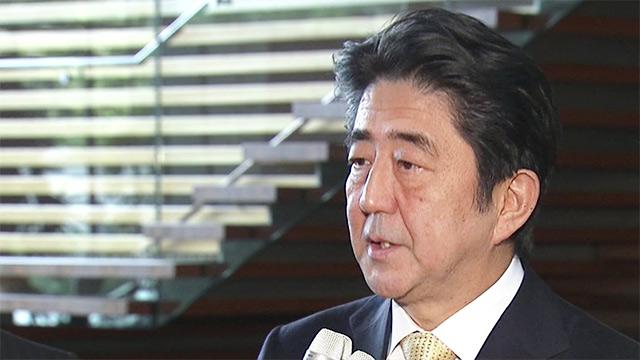Abe returned to power for the second time in December 2012. His Liberal Democratic Party won back the majority in the Lower House, defeating the then-ruling Democratic Party of Japan.
"Let's do our best to return to a strong economy."
Shinzo Abe / Japanese Prime Minister
Abe pushed through a collection of revitalization plans called "Abenomics" aimed at ending decades of deflation.
Seven months after he took office, Abe and LDP coalition partner Komeito swept to victory again in the Upper House election.
With both houses under his control, Abe gained momentum to proceed with a longstanding defense policy goal.
Abe and his Cabinet agreed to change the way the Constitution had been interpreted.
That included allowing the country to exercise its right to collective self-defense. They want Japan to be able to defend closely related countries under attack on certain conditions. But that desire has yet to become law.
In September, Abe reshuffled his Cabinet for the first time since he took office in 2012. He wanted to build fresh support for his policies, including strengthening Japan's ability to protect itself.
He appointed 5 female ministers, in an effort to promote the role of women in society.
But two of them resigned within two months of assuming their new positions over allegations of political funding irregularities and violation of the election law.
"As prime minister, I am responsible for appointing the two ministers. I apologize to the public for creating this situation."
Shinzo Abe / Japanese Prime Minister
Recent sluggish consumer spending is likely adding to the prime minister's concerns. And a recent NHK poll suggests over 40 percent of respondents think a proposed consumption tax increase from 8 to 10 percent next October should be delayed.
The survey also indicated that popular support for Abe's Cabinet has dropped to 44 percent...the lowest level since Abe took office.
But, the tax-hike became law in August 2012, based on an agreement between the LDP, Komeito and the-then ruling Democratic Party.
Delaying the hike would require amending the law.
Even some ruling-party lawmakers are cautious about delaying the tax hike. But Abe is now turning to another source of support for his decision... the voters.
